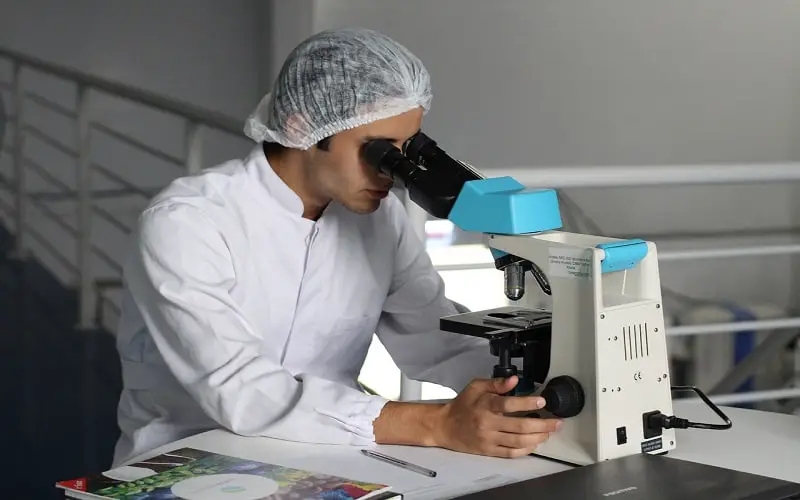You need to be well-versed in cell theory when preparing for a cell biology interview. Therefore, ensure that you take your time to research before the interview to avoid coming off as inexperienced and incompetent.
There are many cell biology jobs in various organizations, which makes your dream job an interview away. I hope that these 25 questions help you prepare well for the next time you have an interview to ensure you can sell yourself and your qualifications.
1. Why Are You Interested in this Role?
I find all living beings interesting. I have always been curious about what structures make up these organisms. This curiosity sparked my interest in this field. This role will allow me to grow and expand my knowledge on specific structures in different organisms. It is also a fantastic opportunity to work with fellow great minds to determine and understand the interaction of cells and living organisms.
2. What Are the Roles of a Cell Biologist?
A cell biologist conducts research on various topics, designs new laboratory equipment and analyzes experimental data. He/ she may also write books, research papers, or articles on their findings. A senior cell biologist with vast experience may be assigned to oversee major laboratories and play managerial roles such as the supervision and teaching staff.
3. Describe Briefly About Your Cell Biology Experience
I have worked as a cell biologist for ten years now with reputable organizations. I started working in this field shortly after acquiring my master’s in cell biology. After five years, the organization I was working with at the time sponsored my schooling, and I pursued a doctorate in the same. In my former workplace, I worked with a team of researchers from the UN on a number of projects they were conducting. This affirms that I am qualified and well versed in this field.
4. What Kind of Strategy and Mindset is Required When Working in this field? Give an Example
A focused mindset is crucial since cell biology involves very many tiny organelles that require attention when dealing with. Similarly, one of the rules that I have learned in my years of working as a cell biologist is that if we get living organisms from their natural habitat for research purposes, we must return them. Therefore, one needs to be extra cautious and focused to ensure that no harm comes to the specimen. In addition to that, one must be open-minded, a mindset that fosters continuous learning. In this field, we discover something every day. Therefore, one can never say that he has learned enough.
5. What Are the Qualities that a Cell Biologist Needs to Have to Be Effective?
A cell biologist needs to pay attention to detail, which means that he/ she should have a keen eye. This is essential when dealing with many tiny structures that make up the cell. An excellent cell biologist also needs to be a good writer, which comes in handy when documenting their research findings as articles or even books. A creative and innovative mind is also essential, especially where one is required to develop new designs for lab equipment and apparatus for research purposes.
6. Describe Your Daily Routine as a Cell Biologist
My daily routine as a cell biologist involves conducting research, acquiring new experimental material such as various cells, writing reports, and research articles. We may have seminar meetings with other researchers when working on a topic together.
7. How Do You Stay Motivated at Work?
I believe that my passion for this job is what keeps me going. It is never a dull day as there is always something new to learn and work on. However, work can sometimes get overwhelming, and at such moments, I turn to my coworkers for new perspectives and inspiration. Working as a team also ensures that one does not get highly overwhelmed as research becomes fun to do together.
8. What Do You Consider to be Your Biggest Achievement as a Cell Biologist?
In my former workplace, I rose to the position of chief researcher, whereby I supervised all research in the laboratory. While there, I did extensive research on Algae Cells with a colleague and even wrote a book on the topic. The organization was kind enough to publish the book and is currently available in the market.
9. Briefly Explain What Cell Theory is
Cell theory is the scientific study of the biological theory to proves that the cell is the main component of living organisms. Therefore, it demonstrates that living beings are made of building blocks which are now called cells.
10. Do All Living Beings Have Cell?
All living beings have cells except viruses. Viruses are made of either RNA or DNA, which is then wrapped by a protein capsule. They lack membranes like other living organisms and also have no cell organelles. For these reasons, they cannot also self-metabolize.
11. Name the Two Classification Groups of Cells
Cells are generally classified into two major groups. These are eukaryotic and prokaryotic. Eukaryotic cells have the cell nucleus delimited by a membrane, while the nucleus is not delimited in prokaryotic cells.
[VIDEO] Top 25 Cell Biology Interview Questions with Sample Answers: ► Subscribe for more useful videos
12. Differentiate a Plasma Membrane from a Cell Wall
A plasma membrane is also known as the cell membrane. This is the fragile outer membrane of a cell. It is found in all living cells and is made of a phospholipid by layer (this is a layer of fat), embedded proteins, and appended carbohydrates. Due to the fragile nature of the cell membrane, the cell needs more protection. Therefore, other structures support and protect the membrane, and they make up the cell wall. For example, plant cells have a cellulose cell wall.
13. What are the Cell Organelles Involved in Cell Division and the Formation of Cilia and Flagella?
Centrioles are the organelles involved in cell division and the formation of cilia and flagella. Centrioles produce microtubules that create either cilia or flagella in some eukaryotic cells. It is these same microtubules that are essential for cell division.
14. Define Chloroplasts and the Function They Play in Cells
Chloroplasts are organelles found in plants’ cytoplasm and algae cells. They have two boundary membranes and numerous internal sacs made of the membrane. Chloroplasts contain DNA, RNA, ribosomes, and chlorophyll. Chloroplasts are in charge of photosynthesis, which is glucose production for the plants using carbon dioxide, water, and sunlight.
15. What Structures Make Up the Main Components of the Cell Nucleus?
The cell nucleus has various components. However, the main structures are the nucleolus, the chromatin, and the nucleus membrane.
16. Where Do You Find Ribosomes in a Cell and What Function Do, They Play in a Cell?
Ribosomes are found in the cytoplasm. They can either be in the outer area of the nuclear membrane or on the endoplasmic reticulum membrane giving the rough endoplasmic reticulum definition. Ribosomes are responsible for protein synthesis.
17. What are Lysosomes, and What Chemical Do They Contain?
Lysosomes are the organelles responsible for intercellular digestion by making autophagic and heterophonic digestion. They contain a chemical content known as a hydrolase. These are digestive enzymes that are produced by the rough endoplasmic reticulum and stored in the Golgi bodies. Lysosomes clean the cell of the waste cell through digestion. They digest any residual substances from cell metabolism as well as substances entering the cell. The residual substances are shrouded by the lysosomes and are later moved towards the plasma membrane and fuse with it, and liberated to the exterior.
18. Differentiate the rough and smooth endoplasmic reticulum.
While the rough endoplasmic reticulum has many ribosomes attached to its membrane on the outer side, the smooth endoplasmic reticulum lacks any ribosomes attached to its membrane. The rough endoplasmic reticulum synthesizes and stores the proteins made in the ribosomes. On the other hand, the smooth endoplasmic reticulum synthesizes lips and is essential in muscle cells as it plays a role in the conduction of the contraction stimulus.
19. What are Mitochondria? Describe Their Composition, and In What Cells They are Found.
Mitochondria are the cell organelles responsible for cellular respiration and the production of ATP. They have two lipid membranes. The inner membrane demarcates an internal space known as the mitochondrial matrix, where the mitochondrial DNA, RNA, ribosomes, and respiratory enzymes are found. Eukaryotic cells have numerous mitochondria. Cells that tend to use more energy, such as muscle cells, have more mitochondria. It is important to note that mitochondria can replicate as they have their own DNA, RNA, and ribosomes.
20. What is a Plasma Membrane, and What Role Does It Have?
The plasma membrane is a selectively permeable membrane that forms the outer part of the cell and delimits the cell itself, ensuring that it has an interior with conducive conditions for cellular function. Its role is to allow passage and movement of substances into and out of the cell due to its selectively permeable nature.
21. Between Prokaryotic Cells and Eukaryotic Cells, Which Ones Came First in Evolution?
This remains to be a contested topic in biology. However, it is believed the simple cells, that is, the prokaryotic cells appeared much earlier compared to the eukaryotic cells, which are considered to be the more complex cells. This is the most accepted and embraced belief when it comes to the evolution of cells.
22. Draw Out A Few Similarities and Differences Between Lysosomes and Peroxisomes
Lysosomes and peroxisomes are similar in that they are both small membranous vesicles that contain enzymes. They play the role of enclosing residual or waste substances from the internal or external origin by liberating them. However, the two are also quite different. Lysosomes contain hydrolase, a digestive enzyme to break down substances to be digested into smaller molecules. On the other hand, peroxisomes have enzymes that degrade long-chained fatty acids and amino acids and inactive toxic agents such as ethanol. Peroxisomes also contain catalase, which is an enzyme that is responsible for the oxidation of organic compounds.
23. How Much Salary Do You Expect?
I expect to be well compensated for the skills and qualifications that I offer the organization. Having risen to the level of a chief researcher, my former organization paid me $140,000. However, I am open to negotiation. I also hope that there are other benefits, especially health benefits. This is because handling various species and experimental material and chemicals in the lab can be risky. However, I also look forward to benefiting from the organization, not just in monetary terms. In my former workplace, the organization sponsored my doctorate. Therefore, any learning opportunities that the organization would present me with would be highly appreciated.
24. Why Should We Consider You Out of All the Applicants?
With the vast knowledge and skills that I have acquired over the years in this field, I believe I have exactly what this organization is looking for. I can prove to be a valuable asset and help steer the organization into new and greater heights with new research and innovative ideas.
25. Where Do You See Yourself in the Next 5 Years?
In the next five years, I hope to have helped the organization with numerous research projects. I also hope to steer the organization into partnering with the UN for more resources and opportunities. I also look forward to writing a book and research articles to help new cell biologists a good foundation.
Conclusion
Cell biology is an exciting field that presents endless learning opportunities. One needs to be passionate about what he/ she does to achieve good results. Therefore, a keen eye is required together with an open mind to learn new things every day. I hope that these questions will help you prepare well for your interview.
Since cell biology is a very technical subject, the questions asked in such interviews can also be quite technical. However, with adequate preparation, you will be good to go. I hope that these 25 questions give you insight into what to expect in a cell biology interview.




